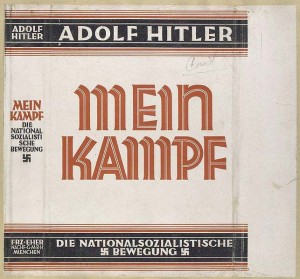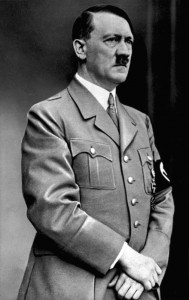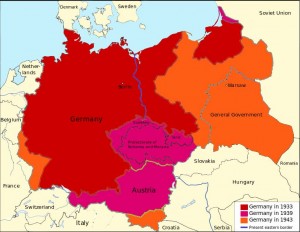 Mein Kampf is the title of a book written by Adolf Hitler, and in English, the title means “my struggle.” The book consists of two volumes, the first one published in 1925, and the second during the following year. The book outlines Hitler’s political philosophy about the state and politics and addresses his opinions on race.
Mein Kampf is the title of a book written by Adolf Hitler, and in English, the title means “my struggle.” The book consists of two volumes, the first one published in 1925, and the second during the following year. The book outlines Hitler’s political philosophy about the state and politics and addresses his opinions on race.
Hitler did not write his book in the traditional sense but rather dictated most of it to his close friend, Rudolf Hess, while he was in the Landsberg prison from 1923 to 1924. Mein Kampf was not a best seller when it was first published. However, millions of copies were sold after Adolf Hitler became the Chancellor of Germany.
Volume One of Mein Kampf
The first volume includes mostly autobiographical work and features his youth and family. He also talks about his personal views on the different races of the world. He describes how he became progressively anti-semitic and militaristic during the years he spent in Vienna. After the National Socialist German Workers’ Party failed to win the 1928 election, Hitler decided he needed to write a sequel to Mein Kampf.
Volume Two of Mein Kampf
Hitler produced a follow-up text primarily for the supporters of National Socialism so they could better understand its goals and ideals. Hitler covered when he joined the German Labour Party and helped to lead the youth movement that awakened the German people. His book also discussed his long-term plans for Germany and the methods that should be used to attain them. Additionally, the second volume covered the battle against communism, Germany’s alliance policy after World War I and what he saw as the best foreign policy for his country.
The Aryan Race
Hitler did not believe that all races were equal or that race was just a social construct. He wrote about the different types of humans and discussed their various physical characteristics, summarizing which races, in his opinion, were superior and an inferior. He firmly believed that the Germanic race with their blond hair, fair skin, and blue eyes were the superior race compared to anyone else. He called the Germanic people Aryans and claimed they were a master race.
Because he believed in the superiority of the Aryan race, he thought all other races were inferior and called them the Untermenschen. He asserted that Jews, Poles, Czechs, and Russians were amongst those that belonged in this inferior class. He advocated for the subordination of the inferior races and thought they should be dominated by their superiors.
In his text, Hitler claims that subjugated races had actually benefited from being in contact with Aryans because they learned from their superior technology and culture. Having said that, he added that it was essential for the Aryan race to remain separate and abstain from marriages with what he considered to be inferior races.
The Jewish Race
Hitler had the harshest criticisms for the Jewish race. He said they were involved in a conspiracy to prevent the Aryans from assuming their rightful position in the world, and that they sought dominion all over the world. The book describes in further detail the fight for world control and domination as being an ongoing political, cultural, and racial battle between the Jewish and Aryan races.
Hitler also detailed his belief that there was a vast international conspiracy by the Jewish race to manipulate world finances, control the press, and promote inferior cultural ideologies. He discussed why liberal democracy and Marxism would hurt the Aryan people. Throughout Mein Kampf, he refers to the Jewish race as liars, wily, sly, clever, and even parasites. He believed that their unscrupulous ways made them the true enemy of the Aryan population.
Military and Territorial Expansion
Germany lost a considerable amount of territory after World War I, and Hitler felt strongly that these areas were essential for German progression and security. He felt that all the land that was taken from Germany after the war should be returned to Germany peacefully, and that if it was not, military force would be justified in reclaiming it. He looked to Britain and Italy as ethnic equals and urged the German people to accept them as allies.
He stated that “Lebensraum,” or “living space,” was essential for the country’s expansion. The areas that Hitler described included Austria, Poland, Czechoslovakia, and large parts of Russia. He stated that the land would be necessary for growing crops and housing the growing Aryan populations. Mein Kampf revealed that the Slavic people should be removed, enslaved or eliminated.
In order to accomplish this, Hitler claimed that Germany would need to defeat France, a nation he considered a long time enemy of the State. As Hitler was very bitter about what happened to the German people after World War I, he openly expressed his opinion that the German Army failed to achieve victory because of political treachery in the parliament of the Weimar Republic. Mein Kampf‘s second volume also named Jewish conspirators as perpetrators of Germany’s loss in the war. Hitler went into some detail about how terrorist methods could be used to achieve the goals of National Socialism.
National Socialism
Hitler thought National Socialism was the best policy for the German people. The party believed in private property rights and endorsed the development of a national solidarity that could rise above class differences. He denounced both communism and capitalism because he associated it with Jewish materialism. When his book sales only reached mediocre levels at best, Hitler attributed their failure to the general unintelligence and misunderstanding of the public. As a result, he consolidated his propaganda into a few main points that were repeated often.
Translations
Since its original publication, there have been several different translations of Mein Kampf. Most of the English translations were abridgements, though a few complete text translations did exist. Today, this book is still very controversial and many countries have banned it from being printed or sold. Post-war Germany enacted laws that prohibited the sale of the book and also any open displays of books that featured the Nazi philosophy.

